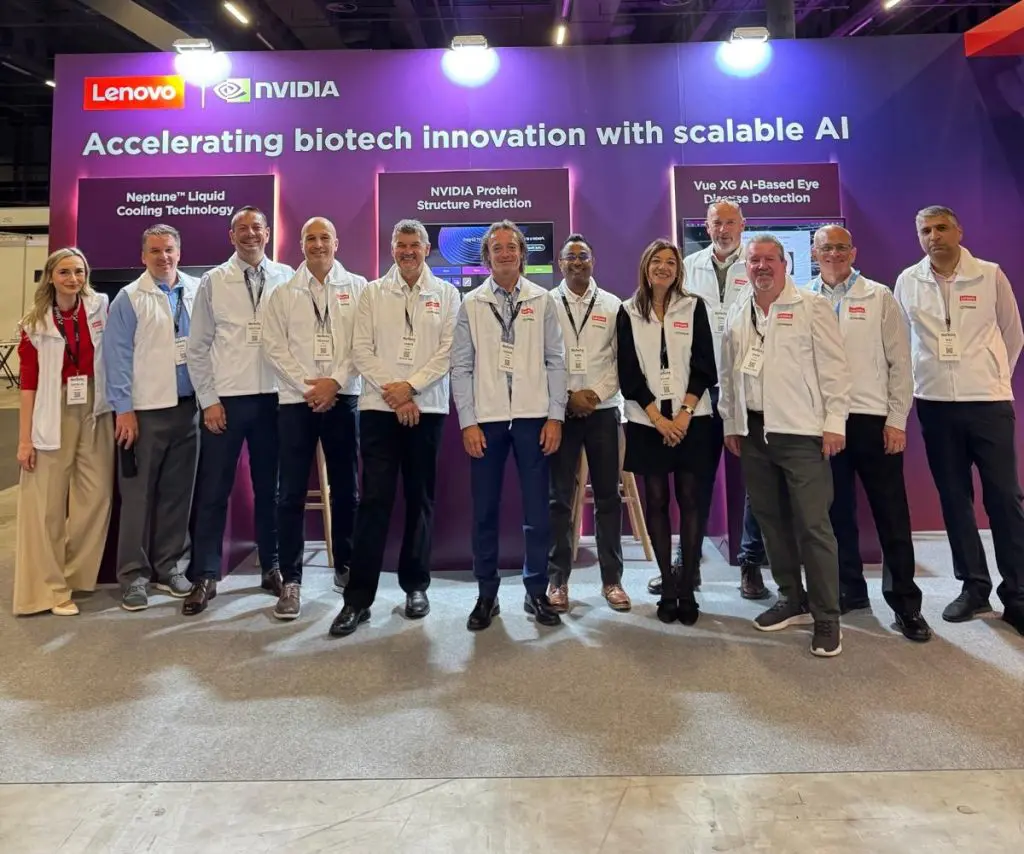When I stepped into BioTechX Europe in Basel this October, one message was clear: AI is no longer an experiment in life sciences, it’s driving real breakthroughs in drug discovery and development. At Lenovo, we believe faster cures and better patient outcomes come from scalable, sustainable AI powered by the right infrastructure. That’s why BioTechX Europe was the ideal place to showcase how our collaboration with NVIDIA is helping bring AI from research and clinical trials to patient delivery.
Over three days, I met inspiring biotech and research leaders who shared one goal: to accelerate the journey from discovery to treatment – faster, smarter, and more sustainably.
On our booth, these conversations came to life through hands-on demonstrations:
- Accelerating Protein Structure Inference: Together with NVIDIA we showcased the world’s fastest protein structure prediction with accelerated Boltz-2 and OpenFold2.
- Next-generation PGX technology: Our newly announced ThinkStation PGX built on the NVIDIA GB10 Grace Blackwell Superchip, brings breakthrough AI performance to a compact form factor. This empowers researchers and developers to run intensive AI workloads at the edge or in the lab, faster and more efficiently than ever before.
- Neptune™ liquid cooling: Our sixth-generation liquid cooling technology went beyond the technical wow factor. What resonated most was its impact: up to 40% lower power consumption and a major step forward in sustainable HPC.
- AI for eye disease detection: Lenovo AI Innovator, Bikal Technologies showcased how its Vue XG platform, powered by Lenovo and NVIDIA, accelerated computing, can analyse retinal images to detect conditions such as diabetic retinopathy and glaucoma earlier and more accurately. This highlights how AI is moving from research into practical, preventative diagnostics that can transform everyday healthcare.
These weren’t abstract concepts, they were practical, real-world applications that biotech leaders could see solving their challenges today.

Why AI Matters in Life Science
From my discussions in Basel, one theme came up repeatedly: the industry knows AI has huge potential, but adoption is still fragmented. Data silos, system interoperability, and public trust remain hurdles. As we’ve written before, AI is not a silver bullet for drug discovery or development. It takes high-quality data, transparency, and human oversight to ensure AI augments care rather than disrupts it.
This year’s AI-nomics research confirms this tension. The life sciences and biotech sector in EMEA was expected to boost AI spending by 169% in 2025 – the largest rise of any industry. Yet, despite this investment level, life sciences and biotech sector also has some of the lowest adoption rates and one of the highest proportions of organizations reporting that AI projects fell short of expectations. The number one barrier? Data quality. For safety-critical areas like drug discovery, clinical trials, and regulatory research, poor data integration and governance continue to limit AI’s full potential.
That’s where trusted partnerships make the difference. Life sciences CIOs told us they look for providers who can deliver data security, privacy, and infrastructure support alongside powerful compute. At Lenovo, that’s exactly our focus – uniting technology, services, and ecosystem partners to help organizations move beyond pilots to real-world, scalable AI in drug development and delivery.
Sustainable Innovation: Breakthroughs Without Trade-offs
This week, many of my conversations weren’t just about speed, but also about sustainability. With energy costs rising and environmental impact under scrutiny, our Neptune Liquid Cooling and end-to-end HPC solutions struck a chord. By reducing energy consumption and carbon footprint while delivering unmatched performance, we’re proving that innovation doesn’t have to come at the planet’s expense.
What’s Next for the Life Sciences Industry?
Walking away from Basel, I feel a sense of optimism. The conversations and general momentum throughout the event confirmed that the industry is ready to move beyond pilot projects and scale AI in meaningful ways. At Lenovo, we’re proud to join forces with NVIDIA, our partners, and our clients to push the boundaries of what’s possible in AI-powered research, drug discovery, and patient delivery.
Our mission is clear: to accelerate biotech innovation with Lenovo and NVIDIA’s scalable AI solutions, and to do it sustainably.
And if the energy at BioTechX Europe this year was anything to go by, the next wave of biotech breakthroughs is already within reach.
